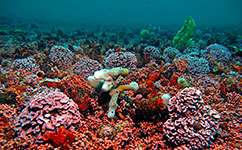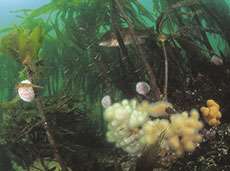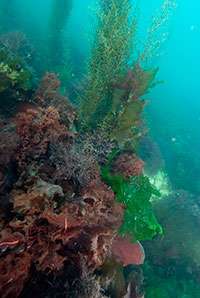High-CO2 world threatens seabed life

Environmental change is transforming many parts of the north-east Atlantic seabed, and according to a newly-published paper this will almost certainly get worse in the coming decades.
For the first time, the paper's authors have brought together research from many different areas to give a systematic idea of how a high-CO2 world will affect ocean flora - the plants and algae at the base of food chains.
There are some bright spots, but the overall picture isn't pretty - kelp forests may be doomed in the south, and northerly waters may be stripped of their maerl habitats. These are thick layers of coral-like calcium carbonate formed over thousands of years by countless generations of slow-growing algae; they form vital habitat for many animals, including economically valuable ones like mussels and scallops.
'Things are changing fast, and changing in ways that affect entire coastlines, not just localised areas,' says Professor Jason Hall-Spencer, a marine biologist at Plymouth University and one of the paper's authors. 'With problems like destructive bottom-trawling, you can try to cordon off parts of the ocean to protect them, but the global trends we're seeing now are even harder to deal with.'
The two main sources of change both stem from human greenhouse-gas emissions. Climate change is steadily warming the oceans, and rising carbon dioxide levels are acidifying them. Together with the rapid spread of invasive species and harm from activities like dredging and trawling, the upshot will be the transformation of many precious ecosystems - in many cases into something far simpler and less diverse.
'Throughout the North Atlantic we can expect major losses of biodiversity, with coastal seabed ecosystems becoming far more homogeneous,' explains Hall-Spencer.

Kelp forest with animal inhabitants.
The ocean warming trend is driving many species towards the poles as their traditional waters become too warm for them to thrive. In the North Atlantic area the researchers looked at, its effects will be felt acutely in the south, off the coast of Portugal.
Here, kelp forests - among the richest and most productive ecosystems on Earth - are likely to disappear as rising temperatures put them under increasing stress. Their place will probably be taken by much simpler ecosystems dominated by small turf-forming seaweeds.
Meanwhile ocean acidification is expected to have powerful effects on the flora of polar waters. Acidification happens when atmospheric CO2 dissolves in seawater to form a weak acid. Over time this brings down the oceans' pH - that is, makes them more acidic - and reduces the levels of dissolved carbonate in the water. Eventually this makes the water corrosive to calcium carbonate, the material from which many marine organisms make their shells and skeletons.
The problem is particularly acute in colder water, because this can absorb more CO2 and has less carbonate to begin with. Because of this, the researchers predict that in polar waters, ocean acidification will prove lethal to millennia-old beds of maerl, dissolving these calcified deposits.
Waters around the UK are expected to be spared the more extreme changes seen further to the north and south, but that's not to say the coastal flora won't be affected profoundly. Kelp forests and seagrass beds are expected to benefit from more CO2 to fuel photosynthesis, and the maerl beds are likely to survive, but in each case the habitats will change, becoming more like those found further south.

We're also likely to see many more invasive species arriving and making life hard for native life as a warming Arctic opens up new polar routes for them to move along - either slowly under their own steam, or by hitching a ride on passing ships.
Once they get here, they're likely to find many attractive opportunities - many of the organisms that previously dominated will be under severe environmental stress. The proliferation of new marine structures such as offshore wind turbines will provide ready-made habitats where new arrivals can get a foothold without having to compete with established natives.
In any case, the invaders are by definition likely to be tough and adaptable. 'If a species can survive the journey from the other side of the world, it's also likely to be able to thrive in fast-changing conditions and outcompete native organisms that are more dependent on a stable environment,' Hall-Spencer comments.
The results of these changes will be complex, though, and not all organisms will lose out. Seagrasses and kelp forests may thrive at high latitudes due to increases in CO2. These are productive ecosystems that raise seawater pH as they grow. If we look after these habitats properly they should continue to store carbon and provide biodiverse habitats for commercially important fish and shellfish.
More information: "The future of the northeast Atlantic benthic flora in a high CO2 world. "Juliet Brodie, Christopher J. Williamson, Dan A. Smale, Nicholas A. Kamenos, Nova Mieszkowska, Rui Santos, Michael Cunliffe, Michael Steinke, Christopher Yesson, Kathryn M. Anderson, Valentina Asnaghi, Colin Brownlee, Heidi L. Burdett, Michael T. Burrows, Sinead Collins, Penelope J. C. Donohue, Ben Harvey, Andrew Foggo, Fanny Noisette, Joana Nunes, Federica Ragazzola, John A. Raven, Daniela N. Schmidt, David Suggett, Mirta Teichberg and Jason M. Hall-Spencer. Ecology & Evolution, DOI: 10.1002/ece3.1105.
Provided by PlanetEarth Online
This story is republished courtesy of Planet Earth online, a free, companion website to the award-winning magazine Planet Earth published and funded by the Natural Environment Research Council (NERC).



















